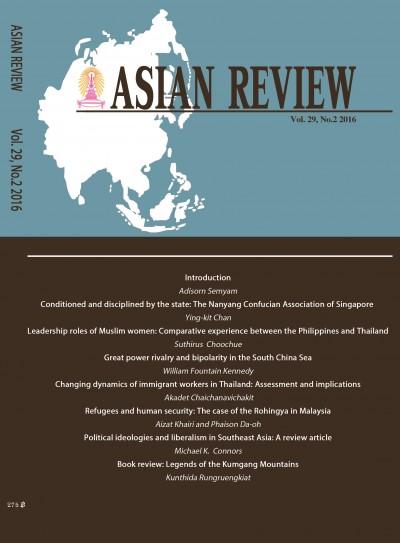


ชื่อวารสาร ASIAN REVIEW 2016 Vol. 29, No. 2
ผู้แต่ง Adisorn Semyam
ปีที่พิมพ์ 2559
ราคา
- 275 บาท/ 1 ฉบับ (300 บาท รวมค่าจัดส่งแบบลงทะเบียน)
- สมัครสมาชิก 600 บาท / 2 ฉบับ รวมค่าจัดส่งแบบลงทะเบียน)
Introduction
Asian Review 2016/2 contains articles reflecting several dimensions of ASEAN including security, ethnicity, migration, and leadership.
William Fountain Kennedy examines “Great power rivalry and bipolarity in the South China Sea” with special attention on the strengthening of bilateral relations between the Philippines and Vietnam, the two ASEAN members involved in disputes over the South China Sea. Both during and since the Cold War, the Philip- pines and Vietnam have valued their maritime connection with the great powers and, in the bipolar context of the Cold War, both Manila and Hanoi eventually permitted Washington and Moscow to station naval forces on their coasts. The withdrawal of US and Russian naval forces from the South China Sea left China without rivals. Beijing emerged as an unchecked naval power in the South China Sea. US-China rivalry, combined with Philippine and Vietnamese unease over Beijing’s hegemonic aspirations, has resulted in the South China Sea again becoming an area of great power rivalry.
Over recent years many ethnic Rohingya have fled from ethnic conflict and religious persecution in Myanmar. While several coun- tries in Southeast Asia are unwilling to accept these immigrants, Indo- nesia and Malaysia have agreed to allow Rohingya refugees temporary shelter, and these two countries have pressed ASEAN to consider the issue seriously in order to find a solution to the humanitarian problem. In “Refugees and human security: The case of the Rohingya in Malaysia,” Aizat Khairi and Phaison Da-oh have investigated the lives of Rohingya people living as refugees in Malaysia using the UNDP’s concept of Human Security. They argue that the Human Security perspective highlights the uncertainty and unpredictability of the daily lives of the Rohingya. However, most of the Rohingya feel grateful for their lives in Malaysia since it is better than in Myanmar.
The competitive economy in the world has persuaded ASEAN to step up cooperation under the Asean Economic Community by 2020. In “Changing dynamics of immigrant workers in Thailand: Assessment
and implications,” Akadet Chaichanavichakit examines the implica- tions for the large numbers of migrant workers in Thailand. As AEC comes into full effect, Myanmar implements political and economic reforms, and globalization opens further migration corridors, many of the low-skilled immigrant workers from Myanmar, Cambodia and Laos will have better domestic and international job opportunities, while a labor shortage in Thailand is expected.
In “Leadership roles of Muslim women: Comparative experience between Philippines and Thailand,” Suthirus Choochuen analyzes the supportive factors for the development of leadership roles amongst Muslim women in the two countries. She has found that the lead- ership roles of Muslim women in southern Thailand are shaped by Islamic culture and contribute to the peace process. In the Philippines, Muslim women enjoy multicultural education and empowerment by human rights advocates. Thai Muslim women leaders have a bottom- up approach to the development of leadership roles whereas their counterparts in the Philippines have a top-down approach.
Mandarin is one of four official languages of Singapore as a result of the government campaign since 1990 to use Mandarin instead of the Chinese dialects such as Hokkien. The people of Singapore have an advantage in the global context because they can speak both English and Mandarin. In “Conditioned and disciplined by the state: The Nanyang Confucian Association of Singapore,” Ying-kit Chan examines how the government of Singapore has handled the sensitive issues of ethnicity and language in a multiethnic society. Singapore’s political governance is not based on a Confucian ethos but a complicated set of notions, policies and institutions that derive mostly from the West.
In a wide-ranging review article, Michael K. Connors examines how the work of Michael Freeden has contributed to the discussion of ideologies, particularly liberalism, both on a world scale and in the context of Southeast Asia. Kunthida Rungruengkiat uses a collection of folktales, Legends of the Kumgang Mountains, as a means to under- stand more about North Korea’s arcane society. The book reveals the contrast between traditional Eastern Asian values, particularly Confu- cian, which identify clear duties for people from different classes, and the egalitarian communism which is the state’s official ideology.


สมัครสมาชิการวารสาร และส่งบทความลงตีพิมพ์ได้ที่ : โครงการสิ่งพิมพ์ สถาบันเอเชียศึกษา จุฬาลงกรณ์มหาวิทยาลัย อาคารประชาธิปก-รำไพพรรณี ชั้น 7 ถนนพญาไท แขวงวังใหม่ เขตปทุมวัน กรุงเทพฯ 10330
หมายเลขโทรศัพท์ : 0-2218-7411, 0-2251-5199 / หมายเลขโทรสาร : 0-2255-1124
Website : http://www.ias.chula.ac.th / E-mail : ias@chula.ac.th
จัดจำหน่ายโดย : ศูนย์หนังสือแห่งจุฬาลงกรณ์มหาวิทยาลัย หมายเลขโทรศัพท์ 0-2218-7000, 0-2255-4433
Website : http://www.chulabook.com























































 วารสาร Asian Review
วารสาร Asian Review
